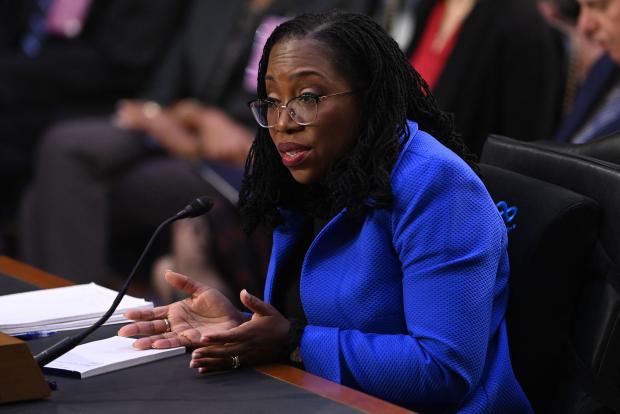Washington — The Senate Judiciary Committee convened Monday to debate and vote on President Biden’s nomination of Ketanji Brown Jackson to the Supreme Court, a meeting that marks the next step in Jackson’s confirmation process as she seeks to make history as the first Black woman to serve on the nation’s highest court.
The committee, composed of 11 Democrats and 11 Republicans, is expected to deadlock on Jackson’s nomination, which would force an additional procedural vote to advance the nomination for consideration by the full Senate.
The likely tie vote demonstrates the partisan polarization that has plagued recent Supreme Court confirmations, as none of the Judiciary panel’s Republican members are expected to vote in favor of Jackson’s nomination even as they extolled her credentials and qualifications.
Despite the anticipated deadlocked vote, Jackson, a judge on the federal appeals court in Washington, will likely be narrowly confirmed by the full Senate by the end of the week.
“Rather than simply another Justice Breyer, she will be the one and only Justice Ketanji Brown Jackson, and Justice Jackson will bring to the Supreme Court the highest level of skill, integrity, civility and grace,” Democratic Sen. Dick Durbin of Illinois, the chairman of the Senate Judiciary Committee, said in remarks opening the meeting.
Durbin said that in the course of the Judiciary panel’s review of Jackson’s record and experience, it became clear she has “impeccable qualifications.” He called the vote on her nomination “nothing less than making history.”
Still, during remarks in the run-up to the committee’s vote, which is expected to take place later Monday, Republicans again raised their criticisms of what they said is Jackson’s pattern of imposing lenient sentences on offenders in child pornography cases. Some GOP senators also took issue with her refusal to label her judicial philosophy, which Jackson described during her confirmation hearings last month as a multi-step methodology in approaching cases.
“We need confidence that judges will interpret the law as they are written. Judge Jackson’s reinterpretation of the law I’ve helped write doesn’t give me that confidence,” said Sen. Chuck Grassley of Iowa, the top Republican on the committee.
Democrats, meanwhile, hailed Jackson for both her demeanor during the bruising question-and-answer sessions, which spanned nearly 24 hours, and her qualifications to serve on the Supreme Court. Many also noted the historical nature of her nomination and the barrier she is poised to shatter if approved by the full Senate.
SAUL LOEB/AFP via Getty Images
“What a reaffirming signal it would send to the American people if we break free from the politics of the moment and unite behind Judge Jackson. What a refreshing departure it’d be from the tired tribalism that has infected virtually every corner of our political system,” Sen. Patrick Leahy, a Democrat from Vermont, said. “Judge Jackson has given me every reason to be hopeful not only for our court, but for our country.”
Senate Democratic leaders are aiming to confirm Jackson before the upper chamber leaves Friday for a two-week recess, and while she can win approval with just Democratic support, the White House has been hoping Jackson will be confirmed with bipartisan backing.
Mr. Biden’s Supreme Court pick will receive at least one GOP vote toward her expected confirmation, as Sen. Susan Collins of Maine announced last week she will support Jackson’s nomination. Two other Republican senators viewed as possible votes in favor of Jackson’s nomination, Sens. Lisa Murkowski of Alaska and Mitt Romney of Utah, have not yet said whether they will vote to confirm her.
Mr. Biden nominated Jackson in late February after Justice Stephen Breyer announced he will retire from the high court at the end of its term this summer. With his pick of Jackson, Mr. Biden fulfilled a pledge he made during the 2020 presidential campaign to name the first Black woman to the Supreme Court.
If confirmed, Jackson’s appointment will not change the ideological makeup of the court, which has a 6-3 conservative majority. But at 51 years old, she is the second-youngest member of the Supreme Court and could serve for decades. She will also diversify the professional experience represented on the high court, having worked as an assistant federal public defender — Jackson would be the first justice to have held such a role — and served on the federal trial court in Washington, D.C.
Justice Sonia Sotomayor is the only current member of the Supreme Court to have served on a U.S. district court.
The upcoming vote by the Senate Judiciary Committee, coupled with the Senate’s likely procedural vote, marks another hurdle in the confirmation process. In addition to appearing before the 22-member panel for two consecutive days of questioning, Jackson answered scores of written questions from the committee members.
While Durbin largely praised senators on the committee for their treatment of Jackson during her confirmation hearings, he lambasted some Republican members, saying they leveled “baseless attacks” on her, accused her of “vile things in front of her” family and “impugned her motives.”
“Judge Jackson is a better person than me. She stayed calm and collected, she showed dignity, grace and poise,” Durbin said. “If there is one positive to take away from these attacks on her, it is that the nation saw the temperament of a good, strong person, ready to serve on the highest court in the land.”
